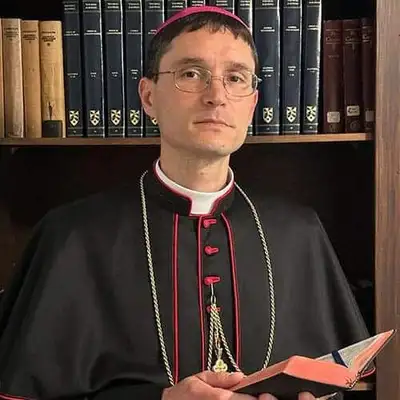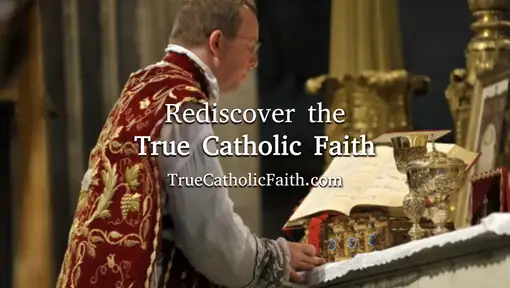Bergoglio, Vatican II, and Hell - Fr. Germán Fliess 09-13-20
Download MP300:02
Be not deceived. God is not mocked. For what things a man shall sow, those also shall he reap. In the name of the Father, and of the Son, and of the Holy Ghost, amen. Those among you who had the misfortune of having been in the Novus Ordo,
00:24
Know by experience that the common belief among the noble sordides, contrary to the inspired words of Saint Paul just quoted, is that everyone goes to heaven. Even though the modernist catechism and other official documents give lip service, very seldomly, to a belief in the existence of hell,
00:52
The truth is that normally the Novosordites, whether lay or clerical, do not believe in Hell. And in the rare cases where they do believe in Hell's existence, they typically dream that either no one goes there, or at most, only a tiny number of persons who commit extraordinary crimes, such as mass murders.
01:25
Bergoglio, in fact, denied that even unrepentant mass murderers go to hell when he said that their souls will just be annihilated, that is, cease to exist. In this single statement, Bergoglio denied two dogmas of faith, namely that unrepentant murders go to hell
01:54
And the Immortality of the Soul. But it is still true that most no sordo religionists simply and plainly do not believe in hell. Of course, the conservative modernist will immediately jump to the defense of the Vatican II religion and say, oh no, that is not what we believe.
02:22
And in proof of it, he will carefully bring forth from among the 2,865 paragraphs of the New Catechism, those five that treat on hell. Now, passing over the downplay and omissions in those five paragraphs, the fact remains that they are only a dead letter.
02:52
Hidden within a thick volume lying on a bookshelf. The crucial truth that hell exists, and more importantly, that it is possible to end up there, and in fact likely, unless one fights against mortal sin, this truth is never preached from the pulpit in the novus ordo religion.
03:20
In fact, it is reasonable to presume that it is not even taught to the people who are receiving religious instruction. Why is it reasonable to believe this is the case? For two reasons. The first is that people generally speaking believe what they are taught when they are children.
03:48
But those who have been raised in the Novus Ordo generally do not believe in the truth of hell and the real possibility of going to it. We all know how children absorb like sponges the basic truths of religion if they are taught to them. But if you ask children raised in the Novus Ordo religion
04:16
You will be lucky enough if they even know what the words hell or eternity mean. This is a sign that these truths are not taught to them. The second and perhaps more compelling reason to safely presume that those truths are not taught
04:41
It's a common sense truth that one teaches and transmits what he believes. Now those who have the office of teaching in the novus ordo religion, and in particular the clergy, as a rule, do not believe in a quite real possibility of one's going to hell.
05:06
Anyone who has had even a minimal amount of dealing with mainstream novus ordo clergy will know that what I say is true. As for myself, I can speak from experience. As was the case with many among you, I was unfortunately raised in the novus ordo and attended the Mass of Paul VI during my early years.
05:37
At a certain time when I was still very young, due to providential circumstances, I came across some literature that spoke clearly on the dreadful and quite real possible of going to hell, and the wonderful promise of Our Lady of Mount Carmel to Saint Simon's talk, namely, receive, my son, this cupular of thy order.
06:05
Whoever dies with it shall not suffer eternal flames. So willing to take all possible measures to avoid the danger of hell, and knowing that the scapular should be duly imposed by a priest, I went to the cathedral church of my native city, which church, at least, I presumed to be Orthodox, as being that of the diocesan bishop,
06:37
There I asked to see a priest. The priest came and met me in the church. I asked him if he could please impose on me the brown scapular, which I brought with me and which I showed to him. He asked me with extreme surprise, why do you want me to do that?
07:02
When I answered that it was to make sure my soul would not end up in hell, he looked at me quite shocked, as if I had said a heresy, and said distinctly to me, we do not believe in that anymore, meaning in hell. He was at least straightforward and quite right on that.
07:26
They do not believe in hell anymore, and that is why they do not fear it, and that is why they do not preach upon it or even speak about it. That was for me, young as I was, a big eye-opener to the fact that the Novus Ordo clergy did not have the Catholic faith. But I am sure that many
07:53
I know that those among you who had the experience of dealing with Novus Ordo clergy have many similar stories to tell. Notice, by the way, on this point of hell, yet another proof of the bogusness of the claims of the Vatican II religionists, which are really nonsensical pretexts for innovation.
08:21
Namely, of being more scriptural and of going back to the genuine teaching of Christ as found in the Gospels. Let us see the facts and judge upon them.
08:39
To begin with, the Vatican II religion, if not on paper, at least in its liturgy, discipline, and preaching, implicitly denies, by systematically and uniformly omitting to teach it, the revealed doctrine of hell, of its reality, of its eternity, and of the quite real danger of our souls going there, unless we watch with fear and trembling.
09:11
The truths just mentioned are among the most explicitly, most frequently, and most emphatically taught throughout sacred scripture. The modernists are systematically and purposely silent about hell. But Christ in the gospel is not only explicit about it,
09:36
He is, in fact, particularly insistent on the necessity to have hellfire and its eternity always before our eyes. There is, in fact, scarcely a single occasion on which our Lord gives a doctrinal instruction to the people in which he does not refer to hell.
10:04
Witness is the most important instruction of Christ and the summary of the Gospel teaching, namely the Sermon of the Mount. Witness also the parable of the marriage feast. Witness the parable of the ten virgins and many, many others. And there is, of course, the description of the final judgment.
10:34
Then, says our Lord, he shall say to them also that shall be on his left hand, depart from me, you cursed, into everlasting fire. And this shall go into everlasting punishment, but the just into life everlasting.
10:59
Now the references, allusions, and explicit mentions of hell on the part of our Lord in the Gospel are so many that in a sermon I do not have the time even to mention them all. And here notice a typical sophism of the modernists by which they try to deceive the simple as a wolf that would devour a lamb.
11:31
No, they say, we do not deny the truth of hell. We still believe it, as can be seen in the catechism and in such and such a document of the CDF. But what is the point to insist on this and to repeat it over and over? If one were to preach to the people that way, they would be scared and would cause more harm than good.
12:03
This shows that the modernists are diametrically opposed to Christ, not only in his teaching, but also in his spirit and way of acting, since our Lord saw no harm in repeating, and repeating in all its vividness, the eternal truth of hell.
12:26
In Saint Mark, for example, our Savior repeats no less than three times, one after the other, the dreadful truth that bitter remorse will gnaw the conscience of the damned eternally, while the fire will never cease. And if thy hands scandalize thee, cut it off.
12:52
It is better for thee to enter into life maimed than having two hands to go into hell into unquenchable fire, where the worm dieth not and the fire is not extinguished. And if thy foot scandalize thee, cut it off. It is better for thee to enter lame into life everlasting than having two feet to be cast into the hell of unquenchable fire,
13:22
Where the worm dieth not, and the fire is not extinguished. And if thy eye scandalize thee, pluck it out. It is better for thee with one eye to enter into the kingdom of God than having two eyes to be cast into the hell of fire. Where the worm dieth not, and the fire is not extinguished.
13:52
Our Lord is, of course, the preacher of preachers and the teacher of teachers. He is the altogether infallible knower of the human nature and of the human heart, since he is the maker of them both. He knows the human heart and knows how it works much better than we know it ourselves.
14:20
But he sees no harm, no inconvenience, no inexpediency in preaching frequently and insistently on hell. Quite to the contrary, he knows the weakness of fallen nature, corrupted after the sin of Adam. He knows how strongly we are inclined to evil, and in particular, to disordered sensual pleasures.
14:48
Which oppose themselves vehemently to our spiritual aspirations and desires. For the flesh lasteth against the spirit, says the apostle, and the spirit against the flesh. For these are contrary one to another, so that you do not the things that you would.
15:15
Our divine Lord knows that a mere wish for spiritual things is not sufficient to make us overcome the great vehemence and even the violence which tempts us to do quite the contrary of what our spiritual aspirations require. The spirit, he says, indeed is willing, but the flesh is weak.
15:45
Christ and after him, his disciples, Saint Paul, know that the fight of the Spirit against the flesh is a hard battle for us. Hence, they know the most effective way to move us to fight strenuously against the flesh is to have always before our eyes, on the one hand, the eternal death that will be meted out to all those who yield to the disordered concupiscence of the flesh.
16:16
And on the other hand, the great and eternal reward that is promised only to those who valiantly crucify their flesh in this life, however hard this is to fallen nature. And all of this is taught in today's epistle by Saint Paul. Be not deceived. God is not mocked.
16:42
For what things a man shall show, those also shall he reap. For he that soweth in his flesh, of the flesh also shall reap corruption. But he that soweth in the Spirit, of the Spirit shall reap life everlasting. And in doing good, let us not fail.
17:06
For in due time, we shall reap, not failing. In the name of the Father, and of the Son, and of the Holy Ghost, Amen.
Creators and Guests


